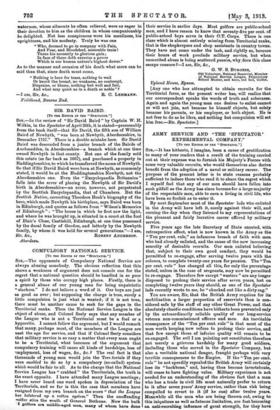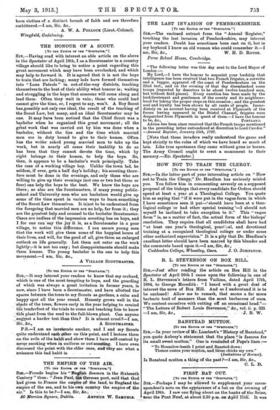ARMY SERVICE AND "THE ' SPECTATOR ' EXPERIMENTAL COMPANY."
[TO THE EDITOR OF THE "SPECTATOR."] SIR,—It has hitherto, I imagine, been a cause of gratification to many of your readers that a result of the training carried out at their expense was to furnish his Majesty's Forces with some very valuable recruits, who would themselves also derive benefit from the adoption of a naval or military career. The purpose of the present letter is to state reasons probably sufficient to induce those who read it to share the regret which I myself feel that any of our men should have fallen into such pitfall as the Army has since become for a large majority of the respectable men, able to earn a living in civil life, who have been so foolish as to enter it.
By next September most of the Spectator lads who enlisted in the Army will have left it, sorely against their will, and cursing the day when they listened to my representations of the pleasant and fairly lucrative career offered by military service.
Five years ago the late Secretary of State enacted, with retrospective effect, what is now known in the Army as the " Ten per cent. rule," an infamous breach of faith with men who had already enlisted, and the cause of the now increasing scarcity of desirable recruits. Our men enlisted believing that, subject to their own good conduct, they would be permitted to re-engage, after serving twelve years with the colours, to complete twenty-one years for pension. The "Ten per cent. rule " has changed all this, for• only the percentage stated, unless in the case of sergeants, may now be permitted to re-engage. Therefore few except "wasters" are any longer disposed to prolong their service after seven years, lest on completing twelve years they should, as one of the Spectator lads recently wrote to me, be "chucked out like a dirty rag."
You are aware, Sir, that the British Army requires for its mobilization a larger proportion of reservists than is con- sidered safe by the staff of any other Great Power, and that absolutely chaotic conditions have hitherto been prevented only by the extraordinarily reliable quality of our long-service veteran non-commissioned officers and men. An inevitable consequence of the "Ten per cent. rule" is that most of the men worth keeping now refuse to prolong their service, and that few except those of inferior quality will remain to be re-engaged. The evil I am pointing out constitutes therefore not merely a grievous hardship for many good soldiers, including those who served in the Spectator Company, but also a veritable national danger, fraught perhaps with very terrible consequences to the Empire. If the " Ten per cent. rule" be not speedily repealed the British Army will certainly lose its "backbone," and, having thus become invertebrate, will cease to have fighting value. Military experience is not needed for an understanding of the obvious fact that a man who has a trade in civil life must naturally prefer to return to it after seven years' Army service, rather than risk being compelled to revert to it (if he can) after twelve years. Meanwhile all the men who are being thrown ont, owing to this iniquitous as well as fatuous limitation, are fast becoming an anti-recruiting influence of great strength, for they have
been victims of a distinct breach of faith and are therefore embittered.—I am, Sir, &c.,



















































 Previous page
Previous page